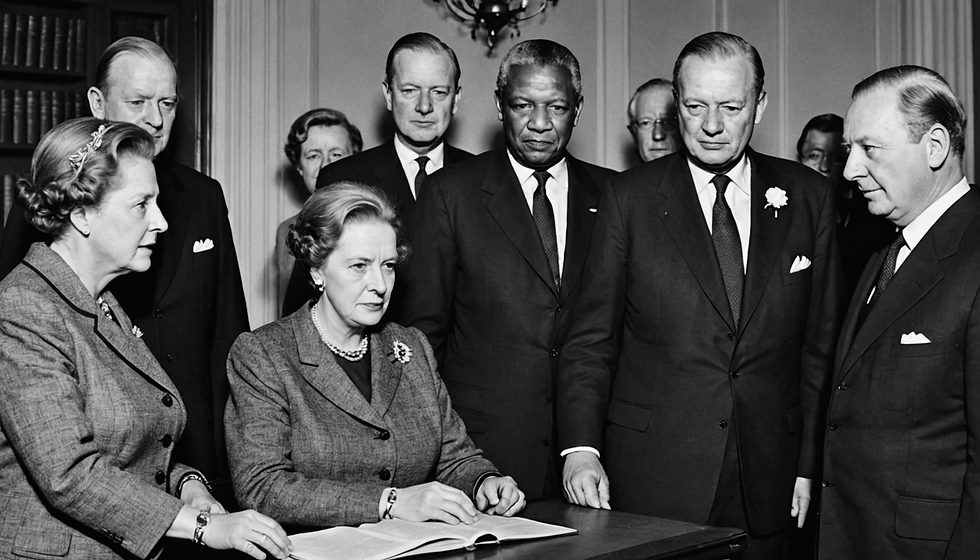Virtues in leadership: How they were used in historical leaders
- R.M. Boylan

- Jan 20
- 3 min read
Virtuous Leadership in Iconic Figures
Not all leaders are perfect. But some were better than others and some showed forms of perfection in history. Below are some of those examples. I chose a few I knew had demonstrated behaviors of virtuous leadership at some point. These included; Elizabeth 1, Queen of England, Margaret Thatcher, Mahatma Gandhi, Nelson Mandela and Sir Winston Churchill.

Virtues demonstrated in Iconic Leaders and how
Main Virtues
When we look at virtues, how can they be measured? They are measured by actions and behaviors generally as thoughts are private. In a leader, we must assess decisions, actions and behaviors to determine whether virtues were at play. There are a number of virtues that we all strive to mimic. However, they are meaningless unless they translate into behavior and influence. Here are the virtues. I will try to demonstrate these virtues with the actions of specific iconic leaders in history so we can see how virtues turn talk into action. How a leader walks the talk on virtuous leadership.
Wisdom
Courage
Justice
Temperance
Compassion
Integrity
Humility
Gratitude
Iconic leaders in history selected to display virtous leadership actions
Iconic leaders such as Elizabeth I, Gandhi, Nelson Mandela, Margaret Thatcher, and Sir Winston Churchill exemplified virtuous leadership through their decision-making processes. Their approaches not only shaped their nations but also left a lasting impact on the world. There are many virtues but how they are expressed in leaders is more important than what they are.
Here’s how each of these leaders applied virtuous leadership to generate meaningful results for the people:
Elizabeth I
Visionary Leadership: Elizabeth I navigated a male-dominated society, establishing herself as a strong monarch. Her vision for a united England helped stabilize the nation at a time when turmoil and divisiveness prevailed.
Diplomatic Acumen: She skillfully managed foreign relations, particularly with Spain and France, ensuring peace and economic stability.
Promotion of the Arts: By supporting the arts, she fostered a cultural renaissance, enhancing national pride and unity.
Gandhi
Nonviolent Resistance: Gandhi's commitment to nonviolence and civil disobedience inspired millions to fight for independence without resorting to violence.
Empowerment of the Masses: He emphasized grassroots involvement, encouraging ordinary people to participate in the struggle for independence.
Focus on Ethical Living: Gandhi advocated for self-sufficiency and ethical consumption, promoting a sustainable and equitable society.
Nelson Mandela
Reconciliation: Mandela's emphasis on forgiveness and reconciliation post-apartheid helped heal a divided nation and fostered unity.
Advocacy for Justice: His leadership focused on dismantling systemic inequalities, promoting human rights for all South Africans.
Global Inspiration: Mandela's moral courage and commitment to justice inspired movements worldwide, making him a symbol of resistance against oppression.
Margaret Thatcher
Decisive Action: Thatcher's strong leadership during economic crises demonstrated her commitment to revitalizing the British economy through bold reforms.
Promotion of Individualism: She championed free-market policies, advocating for personal responsibility and entrepreneurship, which empowered many citizens.
Strong International Stance: Her assertive foreign policy strengthened Britain’s position on the global stage, especially during the Cold War.
Sir Winston Churchill
Inspirational Communication: Churchill's speeches during World War II rallied the British people, instilling hope and resilience in the face of adversity.
Strategic Decision-Making: His ability to make critical decisions under pressure was pivotal in leading Britain to victory in the war.
Advocacy for Democracy: Churchill's staunch defense of democratic values against totalitarianism inspired nations to uphold freedom and justice.
In summary, these leaders applied virtuous leadership principles—such as integrity, empathy, and commitment to the common good—resulting in significant and meaningful outcomes for their nations and the world. Their legacies continue to inspire future generations of leaders.




Comments